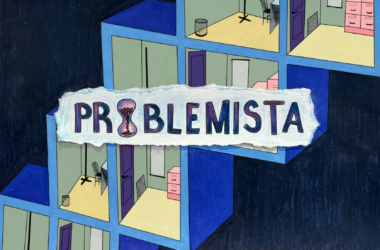Traditionally, a stage reading is a stripped-down version of an author’s work. With no set design and minimal effort put toward costuming or props, performance and plot are at the forefront. Attending a reading allows keen audiences to access an unfinished product. Abandoning notions of polish and perfection relieves creators from the pressures of a full production. With the Queer Reading Series, which ran Jan. 31-Feb. 2, Playwright’s Workshop Montreal provided emerging artists from underrepresented communities with a public platform to share their work, illustrating the diverse new generation of the Montreal theatre scene.
For Ella Kohlmann, the Ontarian playwright behind Exits, this meant sharing her coming-of-age story about a runaway teenager infatuated with Moby Dick. The protagonist’s on-the-run status was a product of a number of factors, including her exploration of sexual identity, and Kohlman showed interest in a breadth of literary themes. Her play tackled existential topics mirroring Melville’s text, such as the pursuit of cementing one’s legacy in the world.
Exits’s reading left a feeling of vulnerability for actors and audience members alike. Unfinished elements of the production were laid bare: Much of the dialogue had not yet been memorized, audio cues sometimes overpowered the actors’ voices, and, in one instance, the lead, Caitlin Cooke, broke character in response to a faulty prop. After the show, a discussion period encouraged questions and criticism from the audience, all of which were directed at Kohlmann. She responded with introspective explanations, offering insight into the decisions she made as a playwright. None of the blunders during the performance detracted from the overall experience; instead, the acting on display hinted at a show brimming with possibility, leaving the audience in high anticipation of the finished product.
Nathaniel Hanula-James’ Untitled Flamingo Play, which showed on the series’ last night, was unfinished only in name. Because the play relied heavily on object theatre, in which the characters are portrayed by props instead of actors, its ‘less-is-more’ setup made it feel fully realized; Hanula-James needed no more than a few household objects to bring an eclectic set of characters to life.
A true auteur, Hanula-James wrote and performed the reading alone. The one-man show was a foray into the mind of seven-year-old Addison, a child trying to find himself in a world full of child-like adults and adult-like children, who must ultimately seek help from a nefarious, moustache-twirling flamingo. By making self-discovery and self-affirmation the focal points of his story, Hanula-James was brazen with his exploration of queer identity. He populated the story with a cast of characters either hell-bent on tormenting the young hero or comically misguided in their attempts to clarify what it means to be gay. Each character was unique, and Hanula-James infused the dialogue with quick retorts and sly wit, often inciting hysterics from his audience by contrasting childish naiveté with adult humour.
Both stage readings broached issues affecting queer youth, namely ostracism and isolation. And, though the creators’ intents were to spark serious discussions about the challenges affecting marginalized voices, their outlooks were never pessimistic. Sidestepping the tragic narratives so often seen in queer fiction, the creators instead stressed the importance of overcoming adversity and shared positive stories they hoped to see reflected in the real world.









